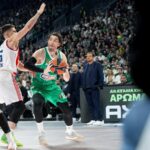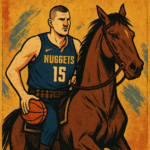 “When it’s all said and done Dirk will end up being the greatest European basketball player to ever play in the NBA, if he isn’t already.” So ran the tangential line from within a story at Bleacher Report entitled “A New Decade: A New Future.”
“When it’s all said and done Dirk will end up being the greatest European basketball player to ever play in the NBA, if he isn’t already.” So ran the tangential line from within a story at Bleacher Report entitled “A New Decade: A New Future.”
Though this contention is taken for granted in the U.S., in this instance the mention of Nowitzki’s preeminence was a stopper. Perhaps it was the prospect of reading more on the really very awful New Jersey Nets or just the simple acknowledgement of a mostly utterly non-clutch player (in the NBA) as the league’s finest ever, but such a premise deserves further inspection.
To the straight-up statistics first – we’ll talk intangibles and relative career success a bit further on – shows one monster compilation of stats indeed. Nowitzki’s career highlights in the NBA include:
• An average game line of 22.8 points and 8.5 rebounds in 36.6 minutes played.
• Currently in his 12th NBA season, has played in 872 of a possible 902 games, or a 96.67% attendance rate.
• The NBA’s 24th all-time leading scorer, at 22.83 ppg just behind George Mikan (23.13) and Vince Carter (23.31) while placing ahead of “Pitchin’ Paul” Arizin (22.81), a Philadelphia Warriors player of the 1950s with career stats strangely similar to Nowitzki’s, and Gilbert Arenas (22.75).
• Fewer than 100 points needed to accumulate 20,000 in career; figures to retire top 20 in the category.
• A career mark of 23.83 in John Hollinger’s PER ratings system, putting Nowitzki at no. 14 all-time and ahead of all non-US players, including Hakeem Olajuwon (23.59, 17th all-time) and Yao Ming (23.04, 21st) – not to mention Kevin Garnett, Kobe Bryant, Oscar Robertson and Larry freaking Bird.
An open and shut case, right? What the Mavericks have gotten in Nowitzki for more than a decade is an always-healthy seven-footer who plays like a small forward with an unstoppable fall-away jumper good for a double-double nearly nightly. Simply put, the greatest European players of our lifetime haven’t compiled the numbers in America that Nowitzki has.
Who can compare? Peja Stojakovic goes down as the no. 2 three-point shooter in the NBA for the 1990s, but three-plus seasons with the New Orleans Hornets have killed even his one-dimensional stats and the glory days of 2003-04 (when he was second in overall scoring at 24.2 ppg) are long gone.
Wish I could make a more valid argument for my main man Toni Kukoc here, but while his NBA career numbers aren’t too shabby – 15.9 ppg, 5.8 rpg, 5.1 apg – they don’t at all stand up to Dirk’s. Nowitzki’s long-time status as franchise player with the Mavericks destroys that of the Chicago Bulls’ sixth man whose peak years were spent in the long shadow of Michael Jordan and the subsequent Terri-Bulls remaining after M.J. left.

Alas, Arvydas: They hardly knew ye.
And then there is Arvydas Sabonis, of course, who entered the NBA at Nowitzki’s current age (31) after having already played some 15 professional seasons in Spain and Lithuania: This parallels Nowitzki’s career in that Dirk is currently entering his 16th professional season after spending four with DJK Würzburg in Germany. Frustratingly, we cannot make the direct comparison, even though analysis from the fantastic Basketball-Statistics would seem to imply that most of Sabonis’ Euroleague (plus probably his ACB stats at peak) would have come over to the NBA with the Lithuanian had he jumped to the U.S. earlier.
So after establishing himself as a consistent and dominant force, Dirk Nowitzki makes quite the convincing case as the best European player ever to play NBA basketball.
And yet. Two essential components are missing from Nowitzki’s true Hall of Fame career: Top-rate defensive ability and an NBA championship title. While Nowitzki is no longer the Irk (as in “Dirk” but with no D) of the Nash-as-comrade days, the most reasonable assessments tend to critique him thusly:
Nowitzki is an improved defender, but two factors of that improvement leave Dirk with the “defensive liability” label glued to his back. For one, Dirk’s advances on the defensive end were incremental, essentially beginning with the Avery Johnson era. For two, Dirk didn’t make a sudden leap in eye-popping defensive displays (a la LeBron), but instead made subtle modifications to his technique and increased his defensive awareness. That’s the kind of adjustment that comes from hours in the gym and the film room, and though Dirk will never be Kevin Garnett, he’s become a perfectly competent (and sometimes downright impressive, as he was against Tim Duncan in overtime last week) defender on one of the best defensive teams in the league.
(If true, one continues to wonder why Nowitzki probably lobbied for the dismissal of Johnson, The Man Who Taught The Mavericks Defense.)
Also of note vis-à-vis Dirk’s relative soft defense is the effect this has (or doesn’t have) on the eye-popping PER rating referenced above for Nowitzki’s career. Since “Hollinger freely admits that two of the defensive statistics it incorporates – blocks and steals – can produce a distorted picture of a player’s value and that PER is not a reliable measure of a player’s defensive acumen,” well, adjust Nowitzki’s all-time value accordingly. (Say to at least below The Big O.)
In fact, while Nowitzki averages an acceptable 1.9 turnovers per game, his career average in stocks (stocks = steals + blocks, statistic © Bill Simmons, The Book of Basketball: The NBA According to The Sports Guy) is just 1.9 – a bit low for a big man. For comparison, Shawn Marion is at 3.8 stocks per game career; Tim Duncan, 3.1; Marcus Camby, 2.9; and Zydrunas Ilgauskas, 2.1.
Stats aside for a moment, though: What about Nowitzki’s (lack of) championship acumen? Sure, he utterly dominated Eurobasket 2005 and nearly single-handedly carried Team Germany to the silver medal – but one could argue that Sabonis, Kukoc and Stojakovic all enjoyed greater success in international play. And for many Americans, Dirk’s leadership will be (unfairly) characterized by the egregious choke job the Mavericks pulled in the 2006 NBA finals.
Nowitzki’s lack of playoff success is something of a mystery in fact. After all, the man has nailed big shots in the U.S. league, perhaps the biggest of which was the jumper in game five of that championship to put Dallas ahead with just over nine seconds remaining. Back to the numbers we go, which show that Dirk actually plays better statistically in 97 playoff games with a nice line of 25.5/11.0/2.6. Could it be that a team with Dirk Nowitzki as its go-to guy *can’t* win the NBA championship?
(Incidentally, with this seeming paradox firmly in place, Mavericks fans must really be sweating this year. For despite their current standing as perhaps second-best squad in the Western Conference, as Cavs the Blog/SLAM online writer John Krolik puts it:
Dallas has a ton of talent, Dirk is right up there with the best players in the league, and the team defends. My caveat would be that they’re thinner than people think, and much more dependent on Dirk. As of December 26th, Dallas was +11.6 points per 100 possessions with Dirk on the floor and a stunning -16.5 points per 100 with Dirk on the bench. As bad as LeBron and Kobe’s benches are, their teams are only -8 when they sit, to offer some perspective.)
So say a minor miracle or two (or perhaps just the annual injury to Andrew Bynum fortuitously timed) goes down and the Dallas Mavericks take the title. Even Ball in Europe might have to admit that Nowitzki is the top Euro player.

The next "All-time greatest"?
Sports being what it is, however, there could well be a new gun looking to take that title the minute Nowitzki rests up: Pau Gasol.
Now in his ninth NBA season, Gasol is besting Nowitzki in rebounds per game (8.8 to 8.5) and assists per game (3.2 to 2.7) while contributing 2.2 stocks per game over the course of his American career. While in the NBA, Gasol has averaged 2.5 turnovers per game, but with the Lakers the number is just 1.9 per. In the premier statistical category – namely, points – the Gasol argument against Nowitzki weakens a bit, with the Spaniard managing “just” 18.8 points per game, a number that won’t significantly increase until Kobe relinquishes more shots.
Nevertheless, NBA-wise, maybe it’s better for the European legend not to be the alpha dog. After all, Gasol’s international career achievements already top Dirk’s, while the former has notched more NBA championship appearances and titles in half the playing time.
For now, then, we’ll begrudgingly accept Nowitzki as best European player ever to be in the NBA – or at least as title-holder of best NBA career by a European player – but this “all-time” standing may not last long. An NBA title for Dallas would certainly go a long way…
If want to pass 642-436 exam then go through 640-816 online training by certkiller. Plus get free demo of HP0-D07 questions for practice.




